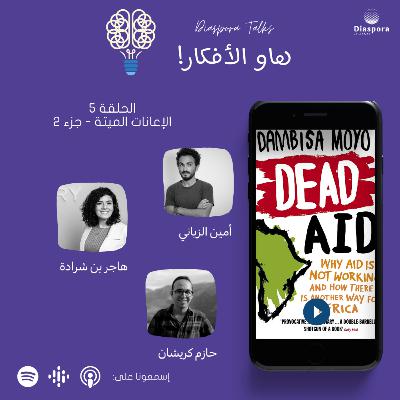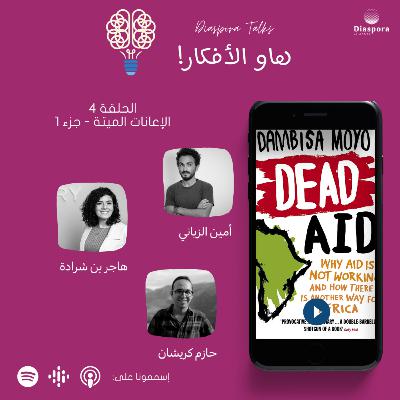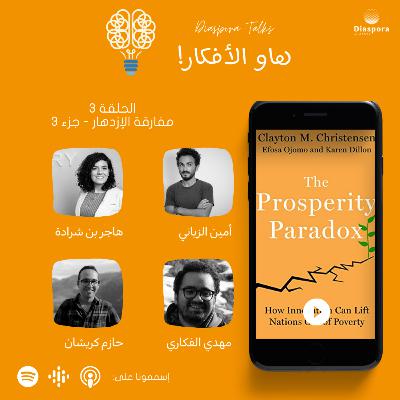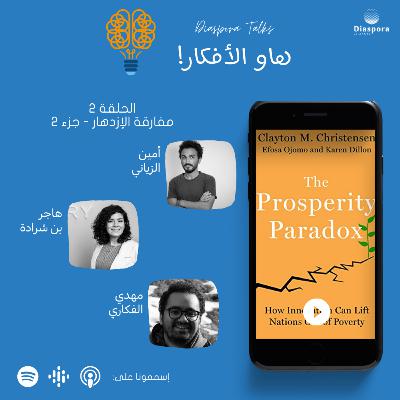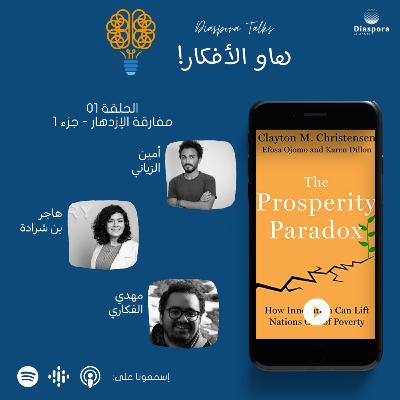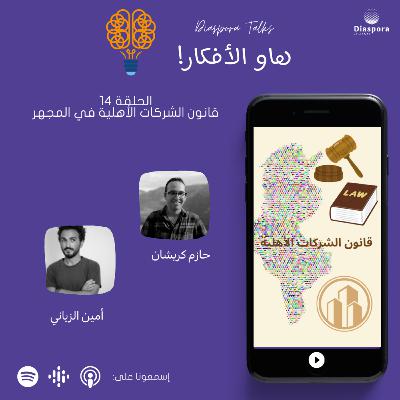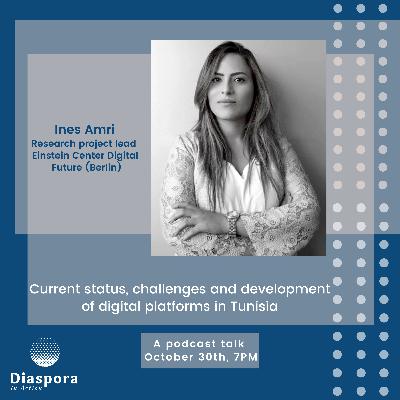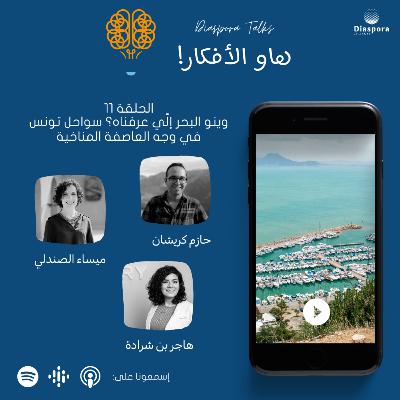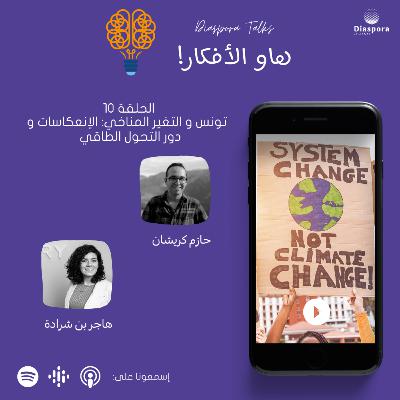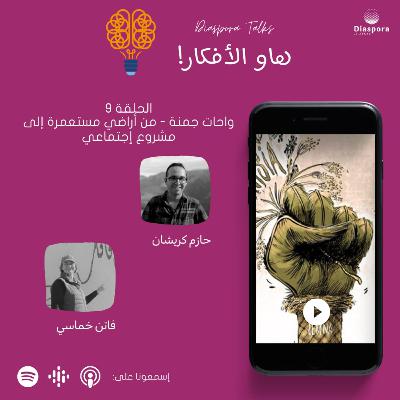Discover Diaspora Talks
Diaspora Talks

Diaspora Talks
Author: Diaspora in Action
Subscribed: 5Played: 5Subscribe
Share
© Diaspora in Action
Description
Diaspora Talks aim at gathering inspiring individuals from the Tunisian diaspora community and give them the stage to share perspectives, life journeys, insights and ideas. Diaspora Talks are inclusive and multi-disciplinary. Our guiding vision is: A prosperous Tunisia.
In our new season "How Lafkar!", we take each time an inspiring idea from a book, a movie, a talk, etc. and try to dissect it with you in easy spoken Tunisian dialect. Share your thoughts with us on LinkedIn: www.linkedin.com/groups/9306252/
In our new season "How Lafkar!", we take each time an inspiring idea from a book, a movie, a talk, etc. and try to dissect it with you in easy spoken Tunisian dialect. Share your thoughts with us on LinkedIn: www.linkedin.com/groups/9306252/
22 Episodes
Reverse
نتناول هذه الأسئلة وغيرها في هذا البودكاست، لاستخلاص دروسٍ قيّمةٍ للتونسيين والمغاربيين الراغبين في المساهمة في تنمية بلدانهم. "المساعدات الميتة" كتابٌ من تأليف دامبيسا مويو، وهي خبيرةٌ اقتصاديةٌ من زامبيا، عملت سابقًا في البنك الدولي، وتتمتع بموقفٍ نقديٍّ. سيُطلعكم مقدمو البرنامج، هاجر بن شرادة وأمين زياني، إلى جانب ضيفنا العزيز والعضو النشط حازم كريشان، على أفكار هذا الكتاب في ثلاثة أجزاء:الجزء الأول: ما هي المساعدات التنموية؟ كيف تطورت؟ وما هي آثارها؟الجزء الثاني: عالمٌ بلا مساعدات.الجزء الثالث: المساعدات التنموية في تونس. نتناول آراءكم وأسئلتكم وتعليقاتكم، مستمعينا الأعزاء.يمكنكم التواصل معنا عبر منصتنا الخاصة بالجالية التونسية: www.diasporainaction.orgتابعونا على إنستغرام ولينكدإنDevelopment aid was instrumental in lifting Korea out of poverty, and in rebuilding Europe after WWII. So why is it not working for other countries?We visit this questions and more in this podcast, to extract lessons relevant to Tunisians and Maghrebis who want to contribute to development in our countries. Dead Aid is a book written by Dambisa Moyo, an economist from Zambia who used to work at the World Bank and who has a critical position. Diaspora in Action members and show hosts Hajer ben Charrada and Amin Zayani together with our dear guest and active member from Hazem Krichene will take you through the ideas in this book in three parts:Part 1: What is development aid? how did it evolve? and what are its implications?Part 2: A world without aid.Part 3: Development Aid in Tunisia. Addressing feedback, questions and comments from you, our dear listeners.You can interact with us on our platform for Tunisian Diaspora: www.diasporainaction.orgFollow us on Instagram and LinkedIn
Development aid was instrumental in lifting Korea out of poverty, and in rebuilding Europe after WWII. So why is it not working for other countries?
We visit this questions and more in this podcast, to extract lessons relevant to Tunisians and Maghrebis who want to contribute to development in our countries. Dead Aid is a book written by Dambisa Moyo, an economist from Zambia who used to work at the World Bank and who has a critical position. Diaspora in Action members and show hosts Hajer ben Charrada and Amin Zayani together with our dear guest and active member from Hazem Krichene will take you through the ideas in this book in three parts:
Part 1: What is development aid? how did it evolve? and what are its implications?
Part 2: A world without aid.
Part 3: Development Aid in Tunisia. Addressing feedback, questions and comments from you, our dear listeners.
You can interact with us on our platform for Tunisian Diaspora: www.diasporainaction.org
Follow us on Instagram and LinkedIn
We explained the principles of the prosperity paradox in Part 1. In Part 2 we visited the ideas of corruption, governance and infrastructure (the previous two episodes). But so far we haven't criticised the book, and that's what we're doing in Part 3.
Is it reasonable to suggest market creating innovations as an alternative to digging wells in Nigeria? What are the other factors that helped South Korea go from receiving development aid to giving aid to other countries? And can we really talk about the USA as a prosperous country?
All this and more is discussed by the show hosts: Hajer ben Charrada, Amin Zayani and our guests Mehdi Fekari and Hazem Krichene.
You can interact with us on our platform for Tunisian Diaspora: www.diasporainaction.org
Follow us on Instagram and LinkedIn
We explained the principles of the prosperity paradox in Part 1 (the previous episode).
In Part 2 we covered: corruption, good laws and infrastructure. Which one of these three pillars is necessary to achieve prosperity? How did South Korea go from a country where gangs pocketed protection money to suing the president and jailing her over corruption charges? What made it possible for a company in Nigeria to build better infrastructure faster than the government? and why can't Tunisia prosper despite a brand new constitution?
All this and more is discussed by the show hosts: Hajer ben Charrada, Amin Zayani and our guest Mehdi Fekari.
You can interact with us on our platform for Tunisian Diaspora: www.diasporainaction.org
Follow us on Instagram and LinkedIn
How was it possible for South Korea to go from a development aid receiver to donor within a few decades? What can we learn from the first African telecom company Celltell? Is a great constitution a must to develop Tunisia?
We visit these questions and more in this podcast, to extract lessons relevant to Tunisians and Maghrebis who want to contribute to development in our countries. The Prosperity Paradox is a brilliant book with a key idea: to effectively fight poverty, don't fight poverty, but rather generate prosperity through market-creating innovations and entire nations will be lifted out of poverty. Diaspora in Action members and show hosts Hajer ben Charrada and Amin Zayani together with our dear guest and active member from Morocco Mehdi Fekari will take you through the ideas in this book in three parts:
Part 1: Market creating innovations with examples from Korea, Japan, Africa and Mexico. What can we learn from Toyota's driving schools, Henry Ford's model T and Singer's sewing machines?
Part 2: Corruption, good laws and infrastructure. Is a shiny new constitution a requirement for development? Does investing in infrastructure create prosperity?
Part 3: Addressing feedback, questions and comments from you, our dear listeners.
You can interact with us on our platform for Tunisian Diaspora: www.diasporainaction.org
Follow us on Instagram and LinkedIn
بعد ما حكينا على الاقتصاد التضامني والتشاركي في بعدو الوطني والعالمي، تو نحطّو الرحال على آخر تطوّر في الموضوع: قانون الشركات الأهلية اللي صدّرُو رئيس الجمهورية قيس سعيّد. بعيد على التجاذبات والأدلجات السياسية، حبّينا نفكّو شفرات القانون هذا باش نفهمو قدّاش ينجم يكون ناجع من الناحية التنموية والاقتصادية.
The second episode of Diaspora Talks hosts Emna Ghariani, a successful Tunisian female entrepreneur based in Silicon Valley. Emna is co-founder & CEO of Veamly, a developer unified workspace for software engineers. As a digital wellbeing activist and productivity guru, she is on mission to fix our relationship with work and to advocate for a brave new world where wellbeing and work/life balance are celebrated to live a full-filling life. She also brings a hybrid model of remote work that puts people and their own wellbeing at the center. Emna's work has been featured on Gitlab, ThriveGlobal, Hackernoon ,etc…
In this podcast talk, Emna will tell us more about her story, venture, and how her passion for entrepreneurship started. We will also discover, together with her, the challenges that female entrepreneurs face in this exciting journey and the lessons learnt to achieve resilience and claim power as a female leader and founder.
In this first edition of Diaspora Talks Podcasts, we will talk about the current status of digital platforms in Tunisia, how these platforms are developing, the challenges they are facing, and the the role COVID-19 crisis has played to boost platforms in Tunisia.
Our Instagram: https://www.instagram.com/diaspora_in_action/Our Youtube channel: https://www.youtube.com/channel/UC4VhFMzuo48Z_X4drtn6oDA
تطوّر المشهد الاقتصادي في تونس في العقود الأخيرة بنسق سريع، وبدّل بعنف عادات الاستهلاك عند التونسي. برشا مواد بلاستيكية ومواد ما هيش عضوية دخلت في حياتنا اليومية، والنتيجة تراكم جبال متاع زبلة وروائح خانقة، في غياب شبه تام لأي منظومة اقتصاد دائري تنجم تحدّ من الكارثة هاذي.التطوّر هذا زاد رسّخ الفوارق الطبقية: برزت طبقة عايشة دايمًا في البريكارية، ما تلقى كان إعادة إنتاج التهميش، وتلجأ بالضرورة للاقتصاد الموازي باش تعيش.الفائض المهول من النفايات من جهة، والتهميش الاجتماعي من جهة أخرى، خلقوا ظاهرة “البرّباشة”. شكونهم البرّباشة؟ كيفاش خرجوا من أزقّة تونس لمصبّ برج شاكير؟هذا هو السؤال اللي لازمنا نجاوبو عليه.Documentary: https://youtu.be/OaozyYW-lCA?si=4nOSDj8SPCeTl6TtThe research article: http://www.credif.org.tn/PORT/doc/SYRACUSE/109856/%D8%A7%D9%84%D8%A8%D8%B1%D8%A8%D8%A7%D8%B4%D8%A9-%D8%A7%D9%88-%D8%A7%D9%82%D8%AA%D8%B5%D8%A7%D8%AF-%D8%A7%D9%84%D9%82%D9%85%D8%A7%D9%85%D8%A9-%D9%81%D9%8A-%D8%AA%D9%88%D9%86%D8%B3-%D9%85%D9%86-%D9%85%D8%B5%D8%A8-%D8%A8%D8%B1%D8%AC-%D8%B4%D8%A7%D9%83%D9%8A%D8%B1-%D8%A7%D9%84%D9%89-%D8%B4%D9%88%D8%A7%D8%B1%D8%B9-%D8%A7%D9%84%D8%B9%D8%A7%D8%B5%D9%85%D8%A9-%D8%A7%D9%84%D9%85%D9%86%D8%AA%D8%AF%D9%89-%D8%A7%D9%84%D8%AA%D9%88%D9%86%D8%B3%D9%8A-%D9%84%D9%84%D8%AD%D9%82%D9%88%D9%82-%D8%A7%D9%84%D8%A7%D9%82%D8%AA%D8%B5%D8%A7?_lg=ar-TNOur Instagram: https://www.instagram.com/diaspora_in_action/Our Youtube channel: https://www.youtube.com/channel/UC4VhFMzuo48Z_X4drtn6oDA
هل مازال شعار "المادّة الشخمة" متاع بورقيبة عايش لتوّة؟علاش مازلنا نسمعو برشة على الانقطاع المبكّر على القراية؟وعلاش التلامذة تنفِر من شعبة الرياضيات؟وهل ميزانية الدولة المخصّصة للتعليم فعلاً تعكس طموحها في إنتاج وإعادة إنتاج العلم والمعرفة؟Instagram: https://www.instagram.com/diaspora_in_action/Youtube: https://www.youtube.com/channel/UC4VhFMzuo48Z_X4drtn6oDA
للوضع الراهن في ڨابس، حبّينا يكون معانا الدكتور حازم كريشان، المختص في الإقتصاد و المناخ ، باش يوضحلنا أكثر اللي قاعد يصير من منظور إقتصادي، ويفسرلنا تداعيات الوضع بطريقة مبسطة وواضحة.نتمنوا إن الحلقة هذه كانت ليها قيمة مضافة لمعلوماتكم و نتمنوا إن الوضع يتحسن في أقرب وقت و ننقذ ما يمكن انقاذه قبل حدوث كوارث أخرى طبيعية و خسائر إنسانية.نتمنوا تخلولنا تعليقكم و تعملوا إشتراك في القناة على Youtube و Instagram.Youtube: https://www.youtube.com/watch?v=YVnBW8LrwUsInstagram: https://www.instagram.com/diaspora_in_action/#Save_Gabes
نهج إسبانيا ما هوش مجرّد سوق دبش رخيص، بل فضاء اجتماعي مصغّر يعكس تعقيدات المجتمع التونسي: التراتبية، الأخلاق، والسياسة اليومية.في الحلقة هذي، نحاولو نفكّكو سؤال جوهري: علاش الغلايقية هما إلي سيطرو على السوق؟هل المسألة نتيجة فقر وتهميش اجتماعي، ولا ثمّة ديناميكيات أعمق تحكم العلاقة بين النفوذ، البقاء، والهوية داخل الفضاء العام؟Follow us on social media:Our Instagram: https://www.instagram.com/diaspora_in_action/Our Youtube: https://www.youtube.com/@diasporainaction40/streamsOur Facebook: https://www.facebook.com/diaspora.in.action.dia/
نهج إسبانيا ما يحتاجش تعريف، كل تونسي يعرفو ويحسّو: بالصياح متاع الباعة، بالضجيج إلي ما يوقفش، وبالسلعة الرخيصة إلي تجبد الصغير والكبير. أما ورا هالصورة الظاهرة، ثمّة عالم آخر يتخبّى: تركيبة اجتماعية وإقتصادية معقّدة، وين يتقاطع الفقير مع التاجر، والعابر مع القاعد، والمدينة مع الريف.ضيفنا في الحلقة هذي هو الباحث و الأستاذ في علم الإجتماع، سفيان جاب الله. باش يرافقنا في جولة أعمق داخل نهج إسبانيا: شنوّة يمثّل للتونسيين، كيفاش يعكس حياة يومية مليانة تناقضات، وشنوّة الصورة الكبيرة إلي يوريها على المجتمع التونسي.Here is to a new episode! We hope you enjoy it.The book: https://ftdes.net/rue-despagne/Mosaique FM: youtube.com/watch?v=whw5IrTiI_IFTDES Tunisie: https://www.youtube.com/watch?v=cy5kAYRMn0AOur Instagram: https://www.instagram.com/diaspora_in_action/Our Facebook: https://www.facebook.com/diaspora.in.action.dia/Our Youtube: https://www.youtube.com/@diasporainaction40
في هذه الحلقة نناقش نماذج حقيقية لحركات استعادة الشركات من قِبَل العمال حول العالم:🇦🇷 من الأرجنتين نتعرف على فندق باوين، مصنع IMPA، ومصنع FaSinPat – كلها تحولت من مؤسسات مفلسة إلى تعاونيات عمالية ذاتية الإدارة رغم الصعوبات.🇫🇷 في فرنسا نكتشف قصة SCOP-TI، مصنع الشاي الذي صمد أكثر من 1300 يوم حتى أصبح ملكًا للعمال.🇪🇸 ونختم بإقليم الباسك مع موندراغون، أكبر شبكة تعاونيات في العالم، ونموذج يُدرّس كبديل حقيقي للرأسمالية التقليدية.استمعوا لهذه القصص الملهمة بين النجاح والفشل، وفكروا: هل يمكن تكرارها عندنا؟ 💡شاركوا آراءكم واشتركوا لمزيد من القصص!Follow us on: Facebook: https://www.facebook.com/diaspora.in.action.dia/Instagram: https://www.instagram.com/diaspora_in_action/Youtube: https://www.youtube.com/@diasporainaction40Spotify: https://open.spotify.com/show/1nOgOuwypSjClUGEqfnTNe#بودكاست #تعاونيات #اقتصاد_اجتماعي
شنوّة معنى الإقتصاد التضامني والتشاركي؟ وشنوّا حكايتو في تونس؟كيفاش يختلف في الجوهر متاعو على النموذج الكلاسيكي متاع الاقتصاد الرأسمالي؟وهل قانون الشركات الأهلية هو فعلاً أول مبادرة من النوع هذا في تونس، ولا هو مجرّد حلقة جديدة في مسار تاريخي أطول بدا من زمان؟الأسئلة هاذي، وزيد أكثر، حكينا عليهم في الحلقة الجديدة من بودكاست هاو الأفكار.ماتنساش تسمع وتشاركنا رأيك!روابط إضافية:https://arabi21.com/story/1567736/%D9%86%D8%B8%D8%A7%D9%85-%D8%A7%D9%84%D8%A3%D9%88%D9%82%D8%A7%D9%81-%D9%81%D9%8A-%D8%AA%D9%88%D9%86%D8%B3-%D9%88%D8%B1%D9%87%D8%A7%D9%86-%D8%A7%D9%84%D8%B3%D9%8A%D8%A7%D8%B3%D9%8A%D9%8A%D9%86-%D9%82%D8%B1%D8%A7%D8%A1%D8%A9-%D9%81%D9%8A-%D9%83%D8%AA%D8%A7%D8%A8Follow us on: Facebook: https://www.facebook.com/diaspora.in.action.dia/Instagram: https://www.instagram.com/diaspora_in_action/Youtube: https://www.youtube.com/@diasporainaction40Spotify: https://open.spotify.com/show/1nOgOuwypSjClUGEqfnTNe
In this episode, we explore the impact of climate change on Tunisia’s coastal environment. Our guest is Mayssa Sandli, CEO and co-founder of BlueTN — Tunisia’s first environmental media platform. Mayssa shares her insights on the growing environmental awareness in the country and how BlueTN is inspiring a new wave of climate consciousness and action.في الحلقة هاذي، نحكيو على تأثير التغيّرات المناخية على السواحل التونسية. ضيفتنا هي ميساء الصندلي، المديرة العامة والمشاركة في تأسيس BlueTN، أوّل منصة إعلامية بيئية في تونس. ميساء باش تحكينا على الوعي البيئي اللي بدا يكبر في البلاد، وكيفاش BlueTN قاعد يساهم في خلق جيل جديد واعي ومتحمّس للعمل البيئي.
في هالسلسلة الجديدة من البودكاست "هاو الأفكار!"، نحبّو نحكيو على موضوع مش كان مهم برشة لبلادنا، أما للكرة الأرضية الكل: التغير المناخي.في الحلقة الأولى، حازم وهاجر باش يحكيو على زوز مواضيع أساسية: تأثير التغير المناخي على الاقتصاد والمجتمع التونسي، والدور اللي تنجم يلعبو الانتقال الطاقي في هالمعادلة. قولولنا شنوة رأيكم على وسائل التواصل الاجتماعي متاعنا (فقط لوجو على Diaspora in Action على إنستغرام و لينكدإن)
وانضمّوا لجروبنا على لينكدإن باش نزيدو نحكيو أكثر: https://www.linkedin.com/groups/9306252/
في 2022 و 2023 حكينا برشا على نقائص النظام الإقتصادي العالمي و الشمولي من بعد الحرب العالمية الثانية و تأثيره السلبي على نجاح عملية إقلاع بلدان الجنوب. في أول حلقة في 2024 حبينا نشوفو فماشي حلول بديلة وين التجربة المحلية تنجم تبرز و تشع لتكمل الإقتصاد الرأسمالي الكلاسيكي. ما كانش لازمنا نمشيو بعيد كا توانسا لإنو التجربة المطروحة في الحلقة هذي جايتنا مل الجنوب التونسي المزيان و بالتحديد من واحات جمنة الواقعة ببلاد نفزاوة بين قبلي و دوز، وين نساء و رجال جمنة عبرو في 2011 عن إرادتهم في إسترجاع أراضيهم المفتكة من وقت الإستعمار الفرنسي و قامو بالاستثمار فيها بطريقة تشاركية و صرف المرابيح في مشاريع موجهة للتنمية الإجتماعية في منطقة جمنة. كيفاش زعمة تواصلت حكاية جمنة و كفاش تعاملت الدولة التونسية مع هذا المشرع الإجتماعي الجريئ؟
In 2022 and 2023, our discussions delved into the constraints imposed by post-World War II economic development policies and their adverse effects on the pathways to prosperity for newly decolonized nations. In this inaugural episode of 2024, our focus shifts towards solutions and reflections on alternative economic policies that could complement the traditional schemes established since 1945. As Tunisians, we're excited to explore a remarkable example from our own country, particularly from the enchanting south, specifically the Jemna Oasis situated in the Guebeli region. In 2011, both women and men from Jemna peacefully voiced their determination to reclaim approximately 300 hectares of land that had been unjustly taken by French colonizers and later by administrations during the post-colonial era. Through a democratic and participatory approach, the people of Jemna invested in their land, resulting in significant revenues in 2014, 2015, and 2016. These profits were entirely directed towards social development initiatives and the improvement of regional infrastructure. In this episode, we delve into the recent advancements of Jemna's economic model and examine how the Tunisian government is responding to this ambitious project.
In this episode, we delve into the South Korean reality to understand the social implications of its economic growth. We try to understand better the clash of social classes, reasons of high elderly suicide rate, toxic work culture, and more which leaves us with the question: Does the capitalistic economic model makes a true prosperity model for societies?


